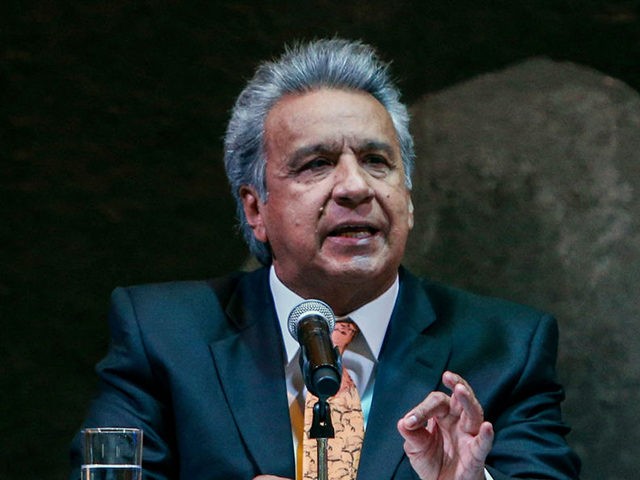Lenin Moreno, the president of Ecuador, warned foreign nations to stay out of the Galápagos Islands in his address to the United Nations General Assembly on Wednesday, a response to reports of hundreds of Chinese fishing ships plundering the natural wonder throughout the summer.
Moreno couched his warning in a call for the member nations of the U.N. to help smaller countries enforce environmental regulations. China, a signatory to the Paris climate agreement, is one of the world’s most egregious climate criminals — the world’s top greenhouse gas emitter, a prime perpetrator of reef destruction in the South China Sea, and producer of about a third of the plastic waste polluting the oceans. The Communist Party also faces frequent accusations of fishing illegally in foreign nations’ waters, most commonly from neighbors like Vietnam and the Philippines.
The Galápagos are considered a natural wonder and are listed as a UNESCO World Heritage site.
After a lengthy introduction urging the world to unite in its fight against the Chinese coronavirus pandemic — which resulted in a significant breakdown of Ecuadorian society in March and April — Moreno turned to the United Nations’ responsibility to preserve the environment.
Moreno did not name China explicitly, but no reports exist of significant illegal fishing taking place in the Galápagos by any other country.
“The failure to enforce environmental agreements has grave, very grave social and economic repercussions. Recently, Ecuador manifested its concern over the presence of a large foreign fishing fleet, which since May 2020 has been active very close to the Galápagos Islands,” Moreno said. “We have reiterated that, regardless of the flag they fly, we will assert our maritime rights over the exclusive economic zone.”
Under the United Nations Convention on the Law of the Seas (UNCLOS), each country has exclusive jurisdiction over the waters up to 12 nautical miles from its shores.
“We are aware of the enormous responsibility of protecting the Galápagos, which is a top natural patrimony of the world. We make a call to nations fishing in the southeast Pacific waters to self-regulate and limit their activities,” Moreno urged. He also claimed to speak on behalf of other South American nations — Chile, Colombia, Ecuador, and Peru, the nations of the Permanent Commission of the South Pacific — in “condemning illegal fishing in zones adjacent to the waters of our countries.”
A study by the marine conservation group Oceana published last week found that hundreds of Chinese vessels had spent over 73,000 hours fishing illegally in the Galápagos waters, primarily targeting the native squid population, in July and August 2020 alone. According to Oceana, “99 percent of the visible fishing activity off the Galápagos Islands during this one-month period was by Chinese-flagged vessels.”
Prior to the report confirming that China was fishing illegally for species that, if endangered, could seriously jeopardize the health of the Galápagos ecosystem, the Ecuadorian Navy announced in July that it had evidence of mass violations of its maritime sovereignty on China’s part and that it would increase patrols to seek out Chinese fishing vessels.
“We are on alert, (conducting) surveillance, patrolling to avoid an incident such as what happened in 2017,” Defense Minister Oswaldo Jarrin said that month. “There is a corridor that is international waters, that’s where the fleet is located.”
At the time, Quito estimated about 260 Chinese ships present in the Galápagos, plundering their animal resources illegally. The Oceana study counted 300 Chinese ships in the area.
The American government issued a statement in August supporting Ecuador’s sovereignty over the Galápagos.
“We firmly support Ecuador’s efforts to ensure [People’s Republic of China] PRC-flagged vessels do not engage in illegal, unreported, and unregulated fishing and stand with States whose economies and natural resources are threatened by PRC-flagged vessels’ disregard for the rule of law and responsible fishing practices,” Secretary of State Mike Pompeo said at the time. “The Ecuadorian government has … rais[ed] the alarm about the hundreds of PRC-flagged vessels fishing near Ecuador’s important Galápagos marine reserve and harvesting endangered sharks for their fins, along with many other protected species.”
The governor of Ecuador has long-established economic ties with the Communist Party of China largely cemented during the tenure of Moreno’s predecessor, socialist Rafael Correa, now a fugitive of Ecuadorian justice in Belgium. Under Correa, a close ally of neighboring dictator Hugo Chávez, the Communist Party reportedly built a nationwide surveillance system for police to track whoever Correa deemed fit. According to a New York Times report, notorious Chinese telecommunications company Huawei built “ECU-911,” a system consisting of thousands of cameras installed in public to monitor citizens.
An Ecuadorian government investigation published in October 2018, following Moreno’s ascent to the presidency, revealed that Correa had also agreed to sell oil to China at prices so low that the nation lost up to $2 billion in profits. Correa reportedly received millions personally while handling the deals with Beijing subsidiary PetroChina.
Fernando Villavicencio, the investigator hired to probe the PetroChina scandal, described the loss as “the greatest heist in the history of Ecuador.”

COMMENTS
Please let us know if you're having issues with commenting.